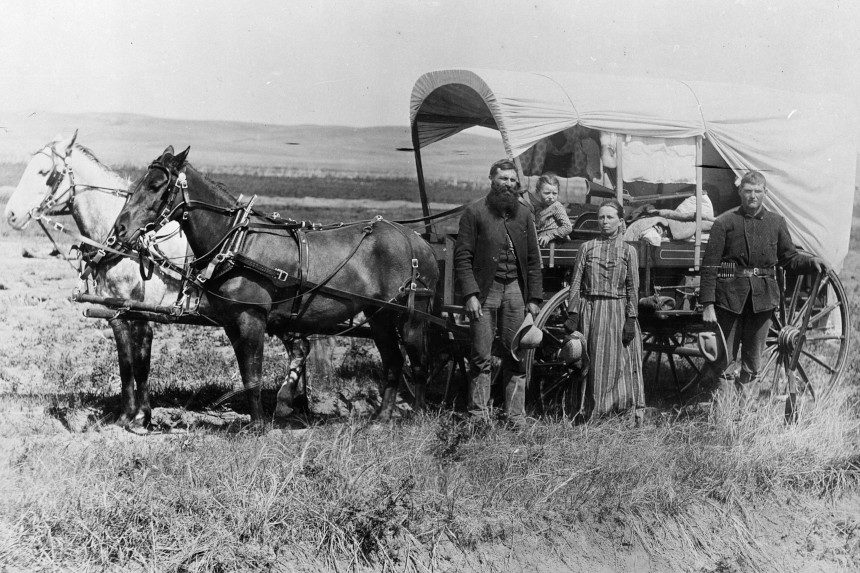Recently, I ran across a phrase I’d never seen. It was in the title of a book by Utah-based survivalist Joel M. Skousen: Strategic Relocation: North American Guide to Safe Places. According to Amazon.com, the fourth edition of Strategic Relocation “considers future threats that most other people fail to see” — including natural disasters, pandemics, stock market crashes, and nuclear war — and highlights out-of-the-way places where one might ride out society’s collapse.
In what now seems like prescient timing, the paperback came out in January 2020.
My family has no immediate plans to strategically relocate. But after years of raging wildfires, power shortages, and rising costs of living, we’ve come to doubt that California is our forever home. As we mull our options, the phrase “strategically relocate” has a nice ring to it. It makes people fleeing, abandoning ship, making a run for it, and ghosting sound like they’re soldiers executing a brilliant military plan.
In fact, this year, absconding is on-trend. People are pouring out of San Francisco, New York, and other cities that are struggling after months of shutdown. As writer James Altucher observed, this is in part because “[b]usinesses have realized that they don’t need their employees at the office,” and high-speed bandwidth allows millions of desk jockeys to Zoom from home.
People who can work anywhere have shown a sudden hankering for country living. Instead of being three blocks from The Apple Store, a futuristic winter-white temple of tiny computers, they long to be “home on the range, where the deer and the antelope play.” Tired of being bombarded with words so discouraging they cannot be printed in a family magazine, they dream of a land of blue skies where “seldom is heard a discouraging word.”
The collective wish for greener pastures is even showing up on Instagram, where a style called “cottagecore” is a top trend of 2020. Photos show young women wearing hairstyles straight out of “Little House on the Prairie,” and clad in “flowy dresses, floral patterns, flower crowns, and vintage style hats,” as one article put it. Tranquil pursuits like baking and gardening abound, as if the student-loan-and-hookup generation has strategically relocated to a simpler time, when tinder was a bundle of sticks used to light a cast iron stove.
When you think about it, strategic relocation is about as American as it gets. Before the first European settlers showed up, nomadic tribes like the Blackfoot, Cheyenne, and Comanche strategically relocated to track buffalo across the great plains. In 1620, a group of English Puritans strategically relocated to a rock in what is now Massachusetts. After the Civil War, the descendants of enslaved people picked up and strategically relocated to wherever they hoped they could find a better life.
Over the centuries, waves of immigrants strategically relocated to our shores, including my maternal great-grandparents and my dad. Once you turn eighteen, strategic relocation is a way of life: first for college, later for jobs, and lastly when you commit a serious crime and need to leave to the country or fake your own death.
Even our literature is full of strategic relocators. At the end of The Adventures of Huckleberry Finn, the teenaged hero decides to “light out for the Territory,” away from the civilizing influence of the Widow Douglas. (After an exciting journey down the Mississippi River with his friend Jim, life at home feels a bit too “cottagecore” for Huck.)
I’m well aware that, if I move, it will make for some awkward moments. Californians are the most disliked strategic relocators, always blowing into other states and acting like Angelina Jolie on the red carpet. We arrive with a long list of unreasonable demands: six dozen white roses (and a single blood-red rose) in our dressing room; bottled water that has been vibrated by the sound of a Tibetan gong and absorbed its healing frequencies; servants to take care of our dogs; a bunch of new, annoying rules we just made up.
But I plan to be the exception: a California transplant whom people don’t hate. I grew up in a small town where getting one’s own truck was a rite of passage. I know how to say hello to the old guys who meet every morning at the donut shop, and how to inquire after the bank teller’s kids. I will not try to make everyone do yoga or urge you to swap out your burgers for green smoothies.
If anyone asks where I relocated from, I’ll reply, strategically: “I’m just happy to be here.”
Featured image: Migrant family heading to the American West, 1886. (National Archives)
Become a Saturday Evening Post member and enjoy unlimited access. Subscribe now




Comments
The impossible dream – re-locators leave at their county or state lines their: demands, expectations, and preconceived notions of rural or small town living. And keep their mouths shut when their ‘new’ lives do not match up with movie and tv inspired depictions. We call it the ‘Californication Syndrome’ – as seen in the Pacific Northwest and Arizona, Texas, and New Mexico.
I dunno, every Californian I’ve dealt with who moved out of state, including a few relatives, has been just plain annoying. Most especially the ones whose families left those areas of the dust bowl and moved to California, then moved “back home”. California is such an artificial place anymore that it affects the attitude of many who live there. Northern Cali is not too bad, Oregon and Western Washington are now horrendous because of the many Californians who moved up there and insisted it be like it was in California. What are you getting away from if you insist the place you move to be like the things you don’t like in the place you left? All I can say is good luck and leave the California attitude behind.
Why have you forgotten to mention that the lawless behavior in major cities is also driving people out. People do not feel safe in the city any more since indiscriminate shootings and killing is a daily event. Innocent people enjoying their families and being victims to gunfire through their very homes is common news. With fascist outsiders coming into the cities to cause trouble, most people would rather live elsewhere.